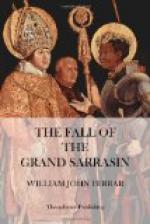“Audience of the holy father—and to-night?” repeated the seneschal, with proud disdain. “Good son, it is impossible, the abbot is engaged with knight and bishop; keep thou thy little matters till thou canst catch his rein, as he rides forth to-morrow.”
“It is no little matter, good brother,” I pleaded, “It is of life and death to many holy men.”
“If it concerned a kingdom,” returned he, “I could not send thee to the abbot now—with the little matters of thy parish to plague him withal,” the fellow muttered under his breath.
As we debated thus, a most reverend monk passed through the corridor, of a strangely lofty and noble air and of a winning sweetness, who stayed his journey as he saw my evident distress.
“What ails thee, O my son?” said he.
“I bear grave and sad news to my lord abbot,” I said, “and news that he should know without delay.”
“What is thy name?” he said, and searched me kindly with his eyes.
I could not lie to him, so I said simply, “Nigel,” as I would fain say no more.
“Then, good Father Nigel,” said he, seeing my reluctance, “I will go whisper in my lord’s ear, if thou wilt tell me more clearly of thy business.”
“Tell him,” said I, “that Abbot Michael, his good brother, has sent me with sad news of the miseries of Vale Abbey.”
“So, my son,” said the monk, gently, and disappeared through the stairway, whence he presently returned, and led me with him.
He led me to a certain fair chamber, wherein sat many great lords around my lord abbot.
“Who is this, brought by our brother of Bec?” said one, as I entered by the side of that great scholar, Lanfranc, the Abbot of Bec.
“This,” said the abbot, an Italian also, “is an envoy from the isle of Guernsey, who comes with greeting from our brother yonder, bearing a sad tale with him, or I am mistaken.”
I knelt to my lord, as he sat in his rich-broidered cloak, with his plump legs cross-gartered, as befits great nobles, and, kissing his hand, begged that I might speak on.
“Nay; first, sir priest,” he said, “tell us thy name, and then thy story.”
“Indeed, father,” I replied, “I am not that I seem; no priest am I, though bred in Vale cloister in Guernsey.”
“Then how darest thou,” said he, hotly, “to come hither in this habit?”
“If thou but knewest the greatness of the perils of our brethren, how they are near being murdered by savage men, thou wouldst forgive me, father. But I bear a name none need fear to own—I am Nigel de Bessin, and mine uncle its vicomte, would vouch for me, were he here——”
“As indeed he is,” put in a pleasant voice of a gentleman that in scarlet cloak sat by my lord’s right hand. “And thou art my nephew?” said he, as I moved forward to do him courtesy.
When we were made known he bade me proceed, assuring me that all my wishes should be fulfilled.




